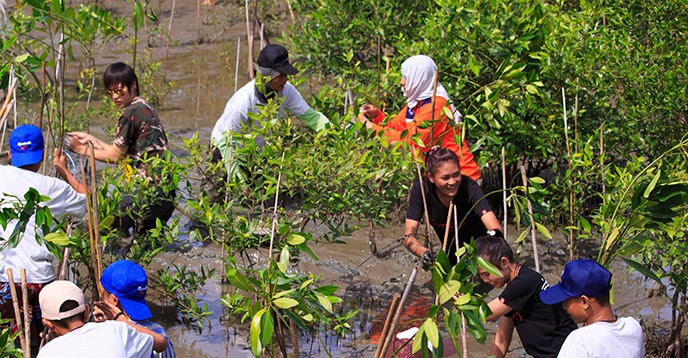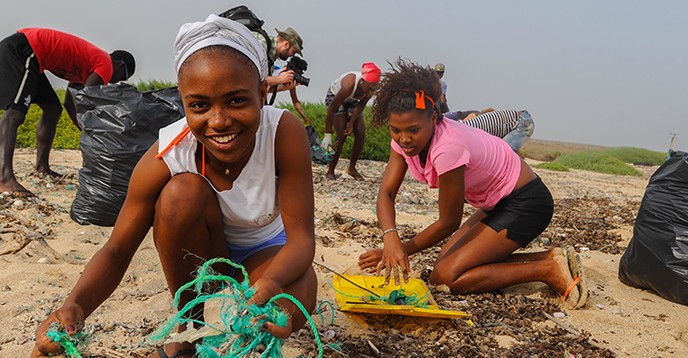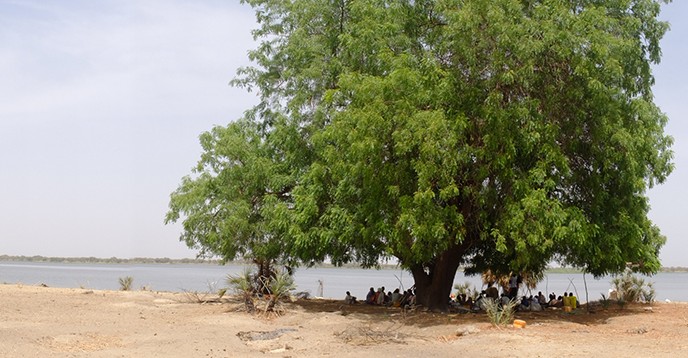World Environment Day

The United Nations designated 5 June as World Environment Day to highlight that the protection and health of the environment is a major issue, which affects the well-being of peoples and economic development throughout the world. The celebration of this day provides us with an opportunity to broaden the basis for an enlightened opinion and responsible conduct by individuals, enterprises and communities in preserving and enhancing the environment.
The year 1972 marked a turning point in the development of international environmental politics, with the first major conference on environmental issues, known as the Conference on the Human Environment, or the Stockholm Conference. Later that year, on 15 December, the General Assembly adopted a resolution (A/RES/2994 (XXVII)) designating June 5 as World Environment Day and urging “Governments and the organizations in the United Nations system to undertake on that day every year world-wide activities reaffirming their concern for the preservation and enhancement of the environment, with a view to deepening environmental awareness.”
UNESCO has an important track record in advancing ecological sciences through pioneering work on ecosystems, biosphere reserves, capacity building, scientific assessments and policy briefs to assist decision-makers in managing natural resources sustainably. UNESCO mobilizes the knowledge, know-how and practices of local communities and indigenous peoples to support their inclusion in environmental decision-making. Its World Network of Biosphere Reserves demonstrate ways to safeguard natural ecosystems and biodiversity through science, education and participatory approaches while promoting innovative economic development that is environmentally sustainable and socially and culturally appropriate.
2021 theme: Reimagine. Recreate. Restore.
World Environment Day 2021 marks the beginning of United Nations Decade on Ecosystem Restoration. Follow the launch events live on 4 and 5 June 2021, and join our call for a reconciliation of humans and nature.
WHAT UNESCO DOES FOR ENVIRONMENTAL PROTECTION
Conservation and sustainable use of biodiversity: UNESCO designated sites
MESSAGE FROM THE DIRECTOR-GENERAL
"As 2021 marks the beginning of United Nations Decade on Ecosystem Restoration, led jointly by the Food and Agriculture Organization of the United Nations (FAO) and the United Nations Environment Programme (UNEP), and with which UNESCO is closely associated, the formidable reservoir of experience accumulated in our biosphere reserves will now be of service to the world.
UNESCO will be responsible for the “Humans in Nature” panel, which will expand and extend the avenues that have been explored for the past 50 years in our biosphere reserves in order to prevent the degradation of ecosystems worldwide."
— Audrey Azoulay, Director-General, on the occasion of World Environment Day 2021
Download the complete message in PDF format
English | Français | Español | Русский | العربية | 汉语
Message from Shamila Nair-Bedouelle, Assistant Director-General for Natural Sciences of UNESCO
With its unique designated sites, UNESCO has been a leader in promoting in-situ solutions to the global challenges of terrestrial, coastal, and marine biodiversity loss.
UNESCO’s strategy for biodiversity is implemented in its designated sites. Over 10 million km², roughly 6% of the earth’s landmass, is already under one or more UNESCO designation, through its 1,121 World Heritage sites (including 252 natural and mixed sites and 114 cultural landscapes), its 714 Biosphere Reserves and its 161 Global Geoparks. UNESCO is also about the soft power to convene diverse interests, unite diverse cultures and emphasize shared human values. UNESCO believes that it is possible to transform mind sets to achieve sufficient momentum to bring change in this critically important UN Decade on Ecosystem Restoration.
World Environment Day 2021: Reimagine, Recreate and Restore
Goodall and Azoulay: "Attacks on nature are contributing to the health crisis."
 On the occasion of the International Day for Biological Diversity, Friday 22 May, Audrey Azoulay, Director-General of UNESCO, Jane Goodall, a primatologist famous for her studies on chimpanzees and ambassador for the Great Apes Survival Partnership launched by the United Nations, remind us that the global COVID-19 crisis must not make us forget to defend our planet's flora and fauna.
On the occasion of the International Day for Biological Diversity, Friday 22 May, Audrey Azoulay, Director-General of UNESCO, Jane Goodall, a primatologist famous for her studies on chimpanzees and ambassador for the Great Apes Survival Partnership launched by the United Nations, remind us that the global COVID-19 crisis must not make us forget to defend our planet's flora and fauna.
©VincentCalmel - Pierre Mouton
MAB YOUTH STORIES
These stories on the importance of biodiversity from the perspective of young people in biosphere reserves were prepared by the Youth Network of the Man and the Biosphere (MAB) Programme. In this article, representatives from around the world give us an insightful overview of the conservation and sustainable use of biodiversity. Read all of the stories
RESOURCES
- Resolution adopted by the General Assembly
- Decision of the Executive Board of UNESCO
- United Nations celebration of this Day
- All Commemorations
- Previous commemorations : 2019 - 2018 - 2017 - 2016 - 2015



















